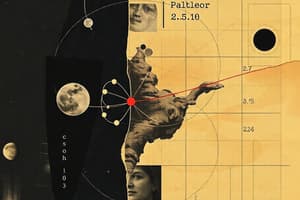Podcast
Questions and Answers
What role does the Planck constant play in quantum mechanics?
What role does the Planck constant play in quantum mechanics?
- It determines the behavior of particles at the atomic scale. (correct)
- It regulates the temperature in superconductors.
- It governs the speed of light in a vacuum.
- It controls the force of gravity between celestial bodies.
How would you define the Planck constant mathematically?
How would you define the Planck constant mathematically?
- 66.26 J
- 6.626 x 10^24 J
- 0.6626 J/s
- 6.626 x 10^-34 J*s (correct)
In what year did Max Planck discover the concept of the Planck constant?
In what year did Max Planck discover the concept of the Planck constant?
- 1923
- 1899 (correct)
- 1905
- 1887
Which of the following phenomena is influenced by the Planck constant?
Which of the following phenomena is influenced by the Planck constant?
Why is the Planck constant considered a bridge between classical laws and quantum phenomena?
Why is the Planck constant considered a bridge between classical laws and quantum phenomena?
How is the value of the Planck constant typically measured?
How is the value of the Planck constant typically measured?
What does the Planck constant link in quantum mechanics?
What does the Planck constant link in quantum mechanics?
How is the wavelength associated with a particle calculated according to de Broglie?
How is the wavelength associated with a particle calculated according to de Broglie?
How has the National Institute of Standards and Technology improved its methodology recently?
How has the National Institute of Standards and Technology improved its methodology recently?
Which field benefits from a precise knowledge of the Planck constant for calibration?
Which field benefits from a precise knowledge of the Planck constant for calibration?
How do superconductors utilize the Planck constant to achieve their properties?
How do superconductors utilize the Planck constant to achieve their properties?
What is crucial for global communication networks and multinational coordinated activity?
What is crucial for global communication networks and multinational coordinated activity?
Flashcards are hidden until you start studying
Study Notes
Planck Constant: A Key Piece of Quantum Physics
The Planck constant is a fundamental physical constant with immense significance in modern physics — particularly within the realm of quantum mechanics. This tiny unit serves as a bridge between our macroscopic world governed by classical laws and the microcosmic realms described by quantum phenomena. Let's explore this intriguing quantity more closely, examining its impact, definition, connection to quantum theory, measurement techniques, and practical applications.
Importance in Physics
Max Planck discovered the concept during his exploration into blackbody radiation in 1899. Despite being small enough to measure only in units like (joules\cdot seconds), it underpins nearly every aspect of quantum behavior from particles' momentum and energy relationships to the wave-particle duality phenomenon. Its relevance extends beyond atomic dimensions; the Planck constant also impacts various macroscopic processes such as superconductivity, laser cooling, and even the operation of certain computer algorithms based upon quantum principles.
Definition
Mathematically speaking, the Planck constant ((h)) can be expressed as follows: [ h=6.626 \times 10^{-34} J \cdot s ]
This value has been measured repeatedly with increasing precision throughout history. For instance, just last year the National Institute of Standards and Technology announced improvements in their methodology, reducing uncertainty down to (7 parts per quadrillion).
Relationship to Quantum Mechanics
In quantum mechanics, the Planck constant links several core concepts, including Heisenberg's Uncertainty Principle and de Broglie waves. According to the former, one cannot simultaneously know both the exact position and velocity of a particle with unlimited accuracy due to the product of uncertainty in position and momentum being larger than (h/4π). On the other hand, de Broglie proposed that all matter exhibits both particle-like and wavelike behaviors, where the wavelength associated with a particle is given by (λ=\frac{h}{mv}) – providing another window into understanding the peculiarities of quantum world.
Experimental Determination
Measuring the Planck constant involves precise experiments utilizing laser light and ultra-stable oscillators. Through these methods, scientists have verified the constancy of the Planck constant across space and time, ensuring its universal application regardless of location or era in human history. Over centuries, numerous instruments have contributed to refining measurements of the Planck constant, each enhancement granting physicists deeper insights into quantum reality.
Applications
Understanding and applying the Planck constant, along with related discoveries, drive technological advancements and scientific breakthroughs. Highlights include:
- Laser spectroscopy: Precise frequency comparisons using lasers rely upon an accurate knowledge of the Planck constant to calibrate devices, offering cutting edge tools used today in areas ranging from telecommunications and GPS systems to astronomical observations.
- Atomic clocks: Based on hydrogen atoms and cesium fibers, these clocks leverage the Planck constant to maintain unprecedented levels of temporal synchronization, which is crucial for global communication networks and multinational coordinated activity.
- Superconductors: Materials whose electrical resistance suddenly vanishes when cooled below specific temperatures exploit zero point motion to create loops of current that persist endlessly. As a result, they form the basis of high-efficiency motors and magnets used worldwide.
Though dauntingly minute, the Planck constant is pivotal to comprehending, manipulating, and taming the enigmatic forces ruling the smallest corners of existence.
Studying That Suits You
Use AI to generate personalized quizzes and flashcards to suit your learning preferences.




